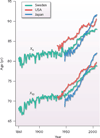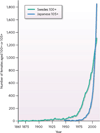Biodemography of human ageing
- PMID: 20336136
- PMCID: PMC4010874
- DOI: 10.1038/nature08984
Biodemography of human ageing
Abstract
Human senescence has been delayed by a decade. This finding, documented in 1994 and bolstered since, is a fundamental discovery about the biology of human ageing, and one with profound implications for individuals, society and the economy. Remarkably, the rate of deterioration with age seems to be constant across individuals and over time: it seems that death is being delayed because people are reaching old age in better health. Research by demographers, epidemiologists and other biomedical researchers suggests that further progress is likely to be made in advancing the frontier of survival - and healthy survival - to even greater ages.
Figures




Comment in
-
Prevention of Late-Life Dementia: No Magic Bullet.Ann Intern Med. 2018 Jan 2;168(1):77-79. doi: 10.7326/M17-3026. Epub 2017 Dec 19. Ann Intern Med. 2018. PMID: 29255884 No abstract available.
References
-
-
Jeune B. Living longer—but better? Aging Clin. Exp. Res. 2002;14:72–92. This engaging account, with 238 references, summarizes ideas and theories about longevity from Genesis and the Sumerian legend of Gilgamesh to the present.
-
-
- Barnes J, editor. The Complete Works of Aristotle: The Revised Oxford Translation. Princeton Univ. Press; 1984. Aristotle; pp. 740–744.
-
- Hygiene: De Sanitate Tuenda. Ch. 2. Vol. 1. Thomas; 1951. Galen.
-
- Bacon R. In: The Code of Health and Longevity. Sinclair J, editor. Constable: 1806.
-
- Cornaro L. The Art of Living Long. Springer; 2005.
Publication types
MeSH terms
Grants and funding
LinkOut - more resources
Full Text Sources
Other Literature Sources
Medical

